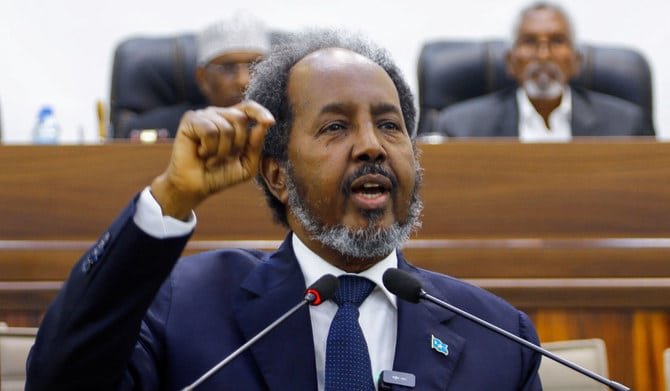Somalia pledged on Tuesday to protect its territory using “any legal means” and recalled its ambassador to Ethiopia after Addis Abeba reached a contentious pact with Somaliland.
Mogadishu called Monday’s unexpected agreement, which grants Ethiopia long-desired access to the Red Sea, a “clear violation” of its sovereignty and urged the international community to support it.
The Addis Abeba agreement came only days after Somalia’s central government agreed to restart talks with the breakaway northern region following years of deadlock.
Since declaring independence from Somalia in 1991, Somaliland has sought complete statehood, a proposal that has been strongly resisted by Mogadishu and is not recognized internationally.
Ethiopian Prime Minister Abiy Ahmed and Somaliland leader Muse Bihi Abdi signed a “historic” memorandum of agreement that grants Ethiopia access to the Red Sea port of Berbera as well as a military base.
“Somaliland is part of Somalia under the Somali constitution, so Somalia finds this step to be a clear violation against its sovereignty and unity,” the Somali Cabinet said in a statement.
It said the agreement was “null and void with no legal basis and Somalia will not accept it.”
“In response to this, the Somali government has recalled its ambassador in Ethiopia for consultation.”
The government also urged the United Nations, African Union, Arab League, and regional East African organization IGAD, among others, to “stand with Somalia’s right to defend its sovereignty and force Ethiopia to comply with international laws.”
Prime Minister Barre urged Somalis to be calm in his address to the country.
“I want to assure you that we are committed to defending the country, we will not allow an inch of land, sea and skies to be violated,” he said.
“We will defend our land with any legal means possible … We must unite and forget about our differences to defend our land, integrity and sovereignty.”
The Ethiopian government had no quick response to Somalia’s statement.
The agreement comes months after Abiy announced that his country, Africa’s second most populous, will demand its right to enter the Red Sea, causing worry among neighbors.
After a three-decade struggle, Eritrea seceded and declared independence in 1993, cutting Ethiopia isolated from the sea.
Addis Abeba had access to an Eritrean port until the two countries went to war in 1998-2000, and since then, Ethiopia has routed the majority of its commerce through Djibouti.
The Ethiopian government did not respond immediately to Somalia’s remark.
The deal comes months after Abiy indicated that his country, Africa’s second most populous, would seek permission to reach the Red Sea, sparking concern among neighbors.
Eritrea won independence in 1993, after a three-decade fight, shutting Ethiopia off from the sea.
Until the two countries went to war in 1998-2000, Addis Abeba had access to an Eritrean port; since then, Ethiopia has routed the majority of its trade through Djibouti.
After two days of meetings mediated by Djibouti President Ismail Omar Guelleh, Somalia and Somaliland agreed to begin talks on Friday, the first of their sort since similar talks stopped in 2020.
The agreement was praised by IGAD, which Somalia only joined in November, and the British Embassy, which called it a “vital step toward reconciliation.”
Somaliland, a former British protectorate of 4.5 million people, produces its own currency, passports, and elects its own government.
Despite being considered as a beacon of peace in the volatile Horn of Africa area, Somaliland’s aspiration for statehood has gone ignored globally, leaving it impoverished and isolated.
Last year, political tensions erupted there as well, resulting in fatal bloodshed.
Despite being considered as a beacon of peace in the volatile Horn of Africa area, Somaliland’s aspiration for statehood has gone ignored globally, leaving it impoverished and isolated.
Last year, political tensions erupted there as well, resulting in fatal bloodshed.





